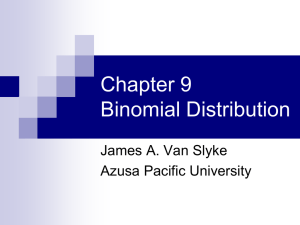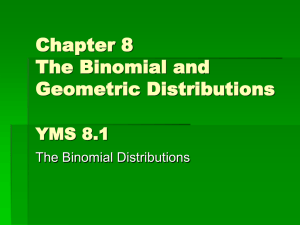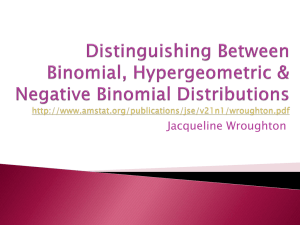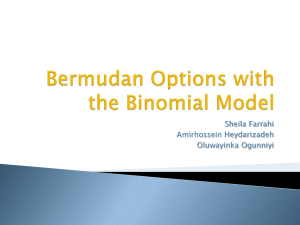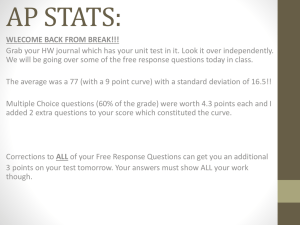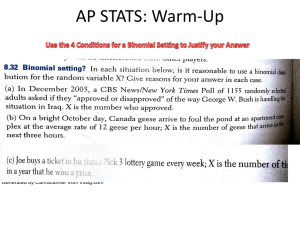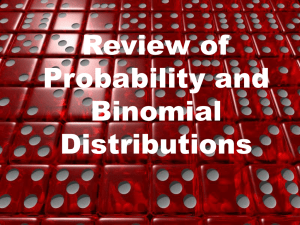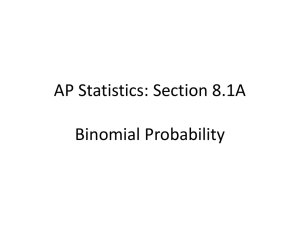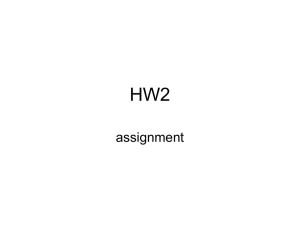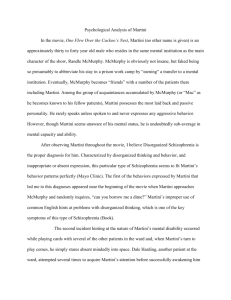Laslett-SelfField-TuneSpread-Momentum-Dependence
advertisement
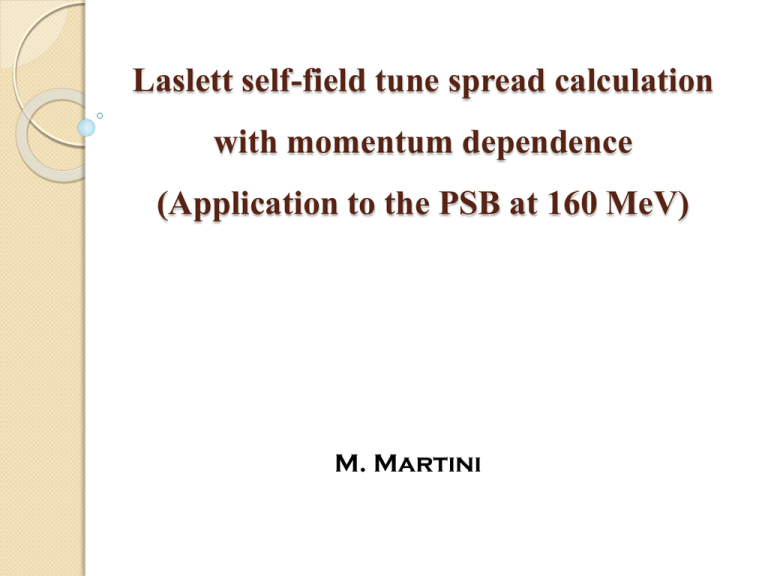
Laslett self-field tune spread calculation with momentum dependence (Application to the PSB at 160 MeV) M. Martini Contents • Two-dimensional binomial distributions • Projected binomial distributions • Laslett space charge self-field tune shift • Laslett space charge tune spread with momentum • Application to the PSB 06/07/2012 M. Martini 2 Two-dimensional binomial distributions Binomial transverse beam distributions • The general case is characterized by a single parameter m > 0 and includes the waterbag distribution (uniform density inside a given ellipse), the parabolic distribution... (c.f. W. Joho, Representation of beam ellipses for transport calculations, SIN-Report, Tm-11-14, 1980. • The Kapchinsky-Vladimirsky distribution (K-V) and the Gaussian distribution are the limiting cases m 0 and m . • For 0 < m < there are no particle outside a given limiting ellipse characterized by the mean beam cross-sectional radii ax and ay. • Unlike a truncated Gaussian the binomial distribution beam profile have continuous derivatives for m 2. m a a 2BD (m, a x , a y , x, y ) x y with a x , y 2m 2 x , y 06/07/2012 x2 y2 1 a2 a2 x y m 1 0 x2 y2 for 1 2 2 1 a a y x x2 y2 for 1 2 2 1 a a y x and u u 2 u M. Martini 2 u x,y 3 Two-dimensional binomial distributions Kapchinsky-Vladimirsky beam distributions (m 0) • Define the Kapchinsky-Vladimirsky distribution (K-V) as KV 2D x2 y2 1 (0, a x , a y , x, y ) 1 2 2 with a x , y 2 x , y ax a y ax a y • Since the projections of B2D(m,ax,ay,x,y) for m 0 and KV2D(m,ax,ay,x,y) yield the same Kapchinsky-Vladimirsky beam profile 1BD (0, a x , a y , x) lim 2 a y 1 x 2 ax 2 m 0 a y 1 x2 ax 1KV D (a x , a y , x) 2 a y 1 x 2 ax 2 a y 1 x2 ax 1 2BD (m, a x , a y , x, y ) dy ax 1 2KVD (ax , a y , x, y ) dy ax x2 1 2 ax x2 1 2 ax 1/ 2 for x a x 1 / 2 for x a x • The 2-dimensional distribution KV2D(m,ax,ay,x,y) can be identified to a binomial limiting case m 0 06/07/2012 M. Martini 4 Two-dimensional binomial distributions 06/07/2012 M. Martini 5 Two-dimensional binomial distributions 06/07/2012 M. Martini 6 Two-dimensional binomial distributions 06/07/2012 M. Martini 7 Two-dimensional binomial distributions Gaussian transverse beam distributions (m ) • The 2-dimensional Gaussian distribution G2D(x,y,x,y) can be identified to a binomial limiting case m since x2 y2 ( x , y , x) lim (m,a x ,a y , x, y ) Exp- 2 - 2 m 2 x y 2 x 2 y G 2D 1 B 2D with u u 2 u , u x,y and 2 06/07/2012 M. Martini a x , y 2m 2 x , y 8 Projected binomial distributions m 1 / 2 2 m ( m) x 1 2 for x a x B 1D (m, a x , x) a x (m 12 ) a x 0 for x a x 1 x 2 1/ 2 x2 1 1 2 for x a x G KV 1D (ax , x) Exp- 2 1D (a x , x) a x a x 2 2 x x 0 for x a x 06/07/2012 M. Martini 9 Projected binomial distributions m ax x 2m 2 x 2 x 06/07/2012 1/2 1 3/2 2 6 √2 √3 2 √5 √6 √14 1BD (m, ax , x) x 2 dx 1/2 1BD (m, ax , x) x 2dx - x 2 x 0 0.577 0.608 0.626 0.637 0.664 0.683 - 1 M. Martini 0.984 0.975 0.960 0.955 10 Laslett space charge self-field tune shift Space charge self-field tune shift (without image field) • For a uniform beam transverse distribution with elliptical cross section (i.e. binomial waterbag m=1) the Laslett space charge tune shift is (c.f. K.Y. Ng, Physics of intensity dependent beam instabilities, World Scientific Publishing, 2006; M. Reiser, Theory and design of charged particle beams,Wiley-VCH, 2008). Q spch 0, x , y spch a y2 ay Nr0 R x , y (ax , y ) spch spch 2 3 ( a ) ( a ) x x, y y x, y Q0, x, y a y2 a x (a x a y ) a x a y • For bunched beam a bunching factor Bf is introduced as the ratio of the averaged beam current to the peak current the tune shift becomes Bf I average I peak Q spch 0, x , y spch Nr0 R x , y (ax , y ) 2 3 Q0, x , y a y2 Bf • Considering binomial transverse beam distributions and using the rms beam sizes x,y instead of the beam radii ax,y yields Q0spch , x, y 06/07/2012 1 2 Nr0 R xspch , y ( x , y ) ( 2m 2) y 1 2 3Q0, x , y Bf 2 y2 M. Martini for 0 m for m 11 Laslett space charge self-field tune shift Space charge self-field tune shift (without image field) • The self-field tune shift can also be expressed in terms of the normalized rms beam emittances defined as Q0spch , x, y n x, y x2, y x, y Nr0 2 Bf xn, y x, y R (smoothapproximation) Qx , y 1 n x, y yn, x y , x x , y 1 (2m 2) 12 for 0 m for m • Nonetheless this expression is not really useful due to contributions of the dispersion Dx,y and relative momentum spread to the rms beam sizes x, y 06/07/2012 x , y xn, y Dx2, y 2 M. Martini 12 Laslett space charge self-field tune shift • For bunched beam with binomial or Gaussian longitudinal distribution the bunching factor Bf can be analytically expressed as (assuming the buckets are filled) Gammam 12 Binomial(bunch length 8m 8 z ) 2 Gammam 1 Bf Erf 2 0.598 Gaussian beam (full bunch length 4 ) z 8 m 06/07/2012 M. Martini 13 Laslett space charge tune spread with momentum Space charge self-field tune spread (without image field) • Tune spread is computed based on the Keil formula (E. Keil, Non-linear space charge effects I, CERN ISR-TH/72-7), extended to a tri-Gaussian beam in the transverse and longitudinal planes to consider the synchrotron motion (M. Martini, An Exact Expression for the Momentum Dependence of the Space Charge Tune Shift in a Gaussian Bunch, PAC, Washington, DC, 1993). ay Qxspch ( x, y, z ) Q0spch 1 ,x a x (1) n n n j1 (2 j1 )!(2 j2 )!(2 j3 )! 2n J ( j1 , j2 , j3 ) j1! j2 ! j3! n 0 2 j1 0 j2 0 j1 j3 l (2( j1 i j2 k ))! 1 k 0 l 0 m 0 ( 2 j1 2i )!( 2 j2 2k )! i! k!l! m! j2 j3 i 0 im 1 (i m)!( j3 k l m)!( j1 j2 i k )! ( j1 j2 i k l )! x ax 2 ( i m 1) Dy Qy a y Raz 06/07/2012 y a y 2 ( j3 k m l ) 2 ( j3 m l ) z az Dx Qz a z Rax 2 ( j1 j2 k m l ) 2 ( j1 i ) Dx Qx a x Raz D y Qz a z Ra y M. Martini 2m 2 ( j2 k ) 14 Laslett space charge tune spread with momentum Tune spread formula • In the above formula j1+j2+j3=n where n is the order of the series expansion. The function J(j1+j2+j3) is computed recursively as 2 n 4 a z 2 1 J (0,0, n) ln a a i 1 2i 1 y x 2 J (1,0, j3 ) wit h a y / a x 1 (n 1) J ( j1 1,0, j3 ) J ( j1 ,0, j3 ) (n 1 / 2)( 2 1) 2 ( j1 1 / 2) J ( j1 1, j2 1, j3 ) J ( j1 , j2 , j3 ) j2 1 / 2 • It holds for bunched beams of ellipsoidal shape with radii defined as ax,y,z = 2x,y,z with Gaussian charge density in the 3-dimensional ellipsoid. It remains valid for non Gaussian beams like Binomial distributions with ax,y,z = (2m+2)x,y,z (0 m < ). • x,y are the rms transverse beam sizes and z the rms longitudinal one, x, y, z are the synchro-betatron amplitudes. Qx,y,z are the nominal betatron and synchrotron tunes. Q 2 z h eVrf 2 2 E0 • R is the machine radius, the other parameters Dx,y, , e, h, E0... are the usual ones. 06/07/2012 M. Martini 15 Application to the PSB • All the space-charge tune spread have been computed to the 12th order but higher the expansion order better is the tune footprint (15th order is really fine but time consuming) PSB MD: 22 May 2012 Total particle number = 950 1010 Full bunch length = 627 ns Qx0 = 4.10 (tr=4) Qy0 = 4.21 Ek = 160 MeV xn (rms) = 15 m yn (rms) = 7.5 m p/p = 1.44 10-3 Bunching factor (meas) = 0.473 RF voltage= 8 kV h = 1 RF voltage= 8 kV h = 2 in anti-phase PSB radius = 25 m Qx0 = -0.247 Qy0 = -0.365 12th order run-time 11 h Tune diagram on a PSB 160 MeV plateau for the CNGS-type long bunch The smaller (blue points) tune spread footprint is computed using the Keil formula using a bi-Gaussian in the transverse planes while the larger footprint (orange points) considers a tri-Gaussian in the transverse and longitudinal planes. 06/07/2012 M. Martini 16 Application to the PSB PSB MD: 4 June 2012 Total particle number = 160 1010 Full bunch length = 380 ns Qx0 = 4.10 (tr=4) Qy0 = 4.21 Ek = 160 MeV xn (rms) = 3.3 m yn (rms) = 1.8 m p/p = 2 10-3 Bunching factor (meas) = 0.241 RF voltage= 8 kV h = 1 RF voltage= 8 kV h = 2 in phase Qx0 = -0.221 Qy0 = -0.425 Tune diagram on a PSB 160 MeV plateau for the LHC-type short bunch 06/07/2012 M. Martini 17 Application to the PSB PSB MD: 6 June 2012 Total particle number = 160 1010 Full bunch length = 540 ns Qx0 = 4.10 (tr=4) Qy0 = 4.21 Ek = 160 MeV xn (rms) = 3.4 m yn (rms) = 1.8 m p/p = 1.33 10-3 Bunching factor (meas) = 0.394 RF voltage= 8 kV h = 1 RF voltage= 4 kV h = 2 in antiphase Qx0 = -0.176 Qy0 = -0.288 Tune diagram on a PSB 160 MeV plateau for the LHC-type long bunch 06/07/2012 M. Martini 18
